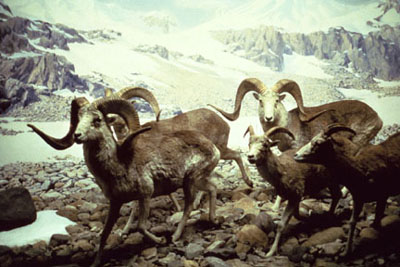

 The Accurate Reloading Forums
The Accurate Reloading Forums  THE ACCURATE RELOADING.COM FORUMS
THE ACCURATE RELOADING.COM FORUMS  Hunting
Hunting  Asian Hunting Forum
Asian Hunting Forum  Radioactive Boars in Fukushima Thwart Residents’ Plans to Return Home
Radioactive Boars in Fukushima Thwart Residents’ Plans to Return HomeGo  | New  | Find  | Notify  | Tools  | Reply  |  |
| one of us |
https://www.nytimes.com/2017/0...-to-return-home.html Radioactive Boars in Fukushima Thwart Residents’ Plans to Return Home By KIMIKO de FREYTAS-TAMURAMARCH 9, 2017 They descend on towns and villages, plundering crops and rampaging through homes. They occasionally attack humans. But perhaps most dangerous of all, the marauders carry with them highly radioactive material. Hundreds of toxic wild boars have been roaming across northern Japan, where the meltdown of the Fukushima nuclear plant six years ago forced thousands of residents to desert their homes, pets and livestock. Some animals, like cattle, were left to rot in their pens. As Japan prepares to lift some evacuation orders on four towns within the more than 12-mile exclusion zone around the Fukushima plant later this month, officials are struggling to clear out the contaminated boars. Wild boar meat is a delicacy in northern Japan, but animals slaughtered since the disaster are too contaminated to eat. According to tests conducted by the Japanese government, some of the boars have shown levels of radioactive element cesium-137 that are 300 times higher than safety standards. Officials have also expressed concern that returning residents may be attacked by the animals, some of which have settled comfortably in abandoned homes and have reportedly lost their shyness to humans. Photographs and video footage of the crisis-hit Japanese towns and villages are reminiscent of Chernobyl, where wildlife continues to thrive despite high radiation levels in the aftermath of the world’s worst nuclear accident in 1986. With the absence of humans, Chernobyl, in Ukraine, has become a refuge for all kinds of animals, including moose, deer, brown bear, lynx and even wolves. Since the nuclear crisis in Fukushima in 2011, video footage taken by journalists has shown packs of badly unkempt dogs scampering across roads. Rat colonies have overrun abandoned supermarkets. Farmland, transformed into grassland, has become a perfect habitat for wild boars and foxes. Boars have caused about $854,000 in damage to agriculture in Fukushima prefecture, reported the Japanese newspaper Yomiuri. The local authorities in towns across Fukushima have hired teams of hunters to cull the boars. It is unclear whether those efforts will pay off, or whether they are enough to persuade former residents to return home. The authorities in the town of Tomioka say they have killed 800 so far, but officials there say that is not enough, according to the Japanese news media. The latest statistics show that in the three years since 2014, the number of boars killed in hunts has grown to 13,000 from 3,000. And in a government survey last year, more than half of Fukushima’s former residents said they wouldn’t return, citing fears over radiation and the safety of the nuclear plant, which will take 40 years to dismantle. The local Fukushima government recently published a guidebook of suggestions to help officials tackle the wild boar problem, including building special traps and using drones to ward off the animals. “It’s important to set up an environment that will make it tough for the boars to live in,” an official told the Yomiuri daily. Elsewhere, the city of Nihonmatsu prepared three mass graves to dispose of 1,800 boars, but the local government says it is already running out of land. The city of Soma last year set up municipal incinerators specially designed to burn carcasses and filter out radioactive cesium. But the authorities said they lack the staff to stuff the animal parts down the furnace. "We need a strong hunting plan,” Hidekiyo Tachiya, the mayor of Soma, told the Asahi Shimbun at the opening of an incinerator last year. “I wish for the day to come when we can eat wild game again.” Correction: March 9, 2017 An earlier version of this article misstated the time period during which the number of boars killed in hunts has grown to 13,000 from 3,000. It is since 2014, not 2011. Kathi kathi@wildtravel.net 708-425-3552 "The world is a book, and those who do not travel read only one page." | ||
|
| one of us |
Europe has the same, even 30 years after Chernobyl. Japs better get used to it. the radioactive fall out elements, like Cesium, get washed into the soil and rooting pigs concentrate them in their bodies. Grizz Indeed, no human being has yet lived under conditions which, considering the prevailing climates of the past, can be regarded as normal. John E Pfeiffer, The Emergence of Man Those who can't skin, can hold a leg. Abraham Lincoln Only one war at a time. Abe Again. | |||
|
| Powered by Social Strata |
| Please Wait. Your request is being processed... |
|
 The Accurate Reloading Forums
The Accurate Reloading Forums  THE ACCURATE RELOADING.COM FORUMS
THE ACCURATE RELOADING.COM FORUMS  Hunting
Hunting  Asian Hunting Forum
Asian Hunting Forum  Radioactive Boars in Fukushima Thwart Residents’ Plans to Return Home
Radioactive Boars in Fukushima Thwart Residents’ Plans to Return Home

Visit our on-line store for AR Memorabilia

